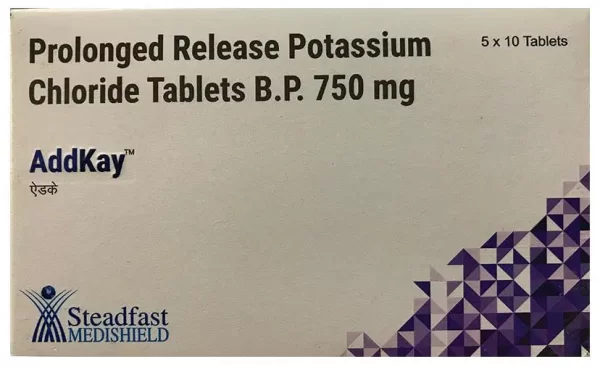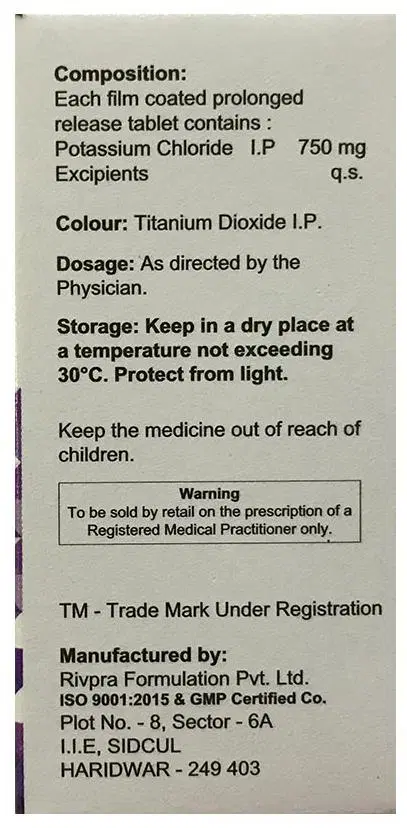K-Tab (Potassium Chloride ER) Tablet ER
Generic
Potassium Chloride ER (Generic Equivalent to K-Tab)
K-Tab Tablet ER are a type of medication containing potassium chloride. Potassium is an essential mineral that plays a vital role in various bodily functions, including nerve transmission, muscle function, and maintaining electrolyte balance.
K-Tab Tablet ER are primarily used to prevent or treat low potassium levels in the blood, a condition known as hypokalemia. Hypokalemia can occur due to various reasons, including certain medications, vomiting, diarrhea, kidney disease, or inadequate dietary intake of potassium-rich foods.
K-Tab Tablet ER are designed to release potassium chloride slowly over an extended period, providing a steady supply of potassium to the body over time. This helps maintain stable blood potassium levels and reduces the risk of gastrointestinal irritation, which can occur with immediate-release potassium supplements.
K-Tab Tablet ER are typically taken orally with plenty of water, usually once or twice daily with food to minimize the risk of stomach upset. It’s essential to swallow the Tablet ER whole and not crush, chew, or break them, as this can affect the extended-release mechanism.
Uses Of K-Tab Tablet ER
- Hypokalemia Treatment
- Supplemental Potassium
- Treatment of Potassium Deficiency Symptoms
Benefits Of K-Tab Tablet ER
Treatment of Hypokalemia
K-Tab Tablet ER are effective in treating low potassium levels in the blood, a condition known as hypokalemia. By providing a slow and sustained release of potassium chloride, K-Tab helps restore normal potassium levels, which is essential for proper muscle function, nerve transmission, and maintaining electrolyte balance.
Supports Cardiovascular Health
Potassium plays a vital role in maintaining heart health and function. Adequate potassium levels help regulate heartbeat and blood pressure, reducing the risk of cardiovascular problems such as arrhythmias (irregular heartbeats), hypertension (high blood pressure), and stroke. By supplementing potassium levels, K-Tab Tablet ER contribute to cardiovascular health.
Side Effects Of K-Tab Tablet ER
It’s essential to use K-Tab Tablet ER as directed by a healthcare professional and to follow their recommendations regarding dosage, administration, and monitoring. If you experience any concerning side effects while taking K-Tab Tablet ER, discontinue use and consult with a healthcare professional for further evaluation and guidance.
Common Side Effects Of K-Tab
- Stomach Ulcers or Ulcerative Colitis
- Hyperkalemia
- Allergic Reactions
How To Use K-Tab Tablet ER
If you have any questions or concerns about how to use K-Tab Tablet ER, don’t hesitate to ask your healthcare provider or pharmacist for clarification. It’s essential to use the medication as directed to achieve the best results and minimize the risk of side effects.
How K-Tab Tablet ER Works
Overall, K-Tab Tablet ER work by providing a slow and sustained supply of potassium chloride, helping to restore normal potassium levels in individuals with hypokalemia and supporting various physiological functions essential for optimal health. It’s important to use K-Tab Tablet ER as directed by a healthcare professional to achieve the desired therapeutic effects while minimizing the risk of side effects.
Disclaimer :The information provided on the website is intended to facilitate awareness about healthcare products and medical conditions generally but it is not a substitute for professional medical attention or advice. You should always speak with a qualified healthcare practitioner before taking any prescription or non-prescription drug. |
| Product Type--Salt | Generic–Potassium Chloride ER (Generic Equivalent to K-Tab) |
|---|---|
| tag--Manufacturer | Top Brand–Steadfast Medishield |
| Power--Pack Size | 750mg–30 Tablets ER, 750mg–60 Tablets ER, 750mg–90 Tablets ER, 750mg–180 Tablets ER |


